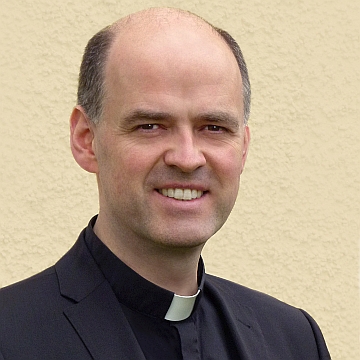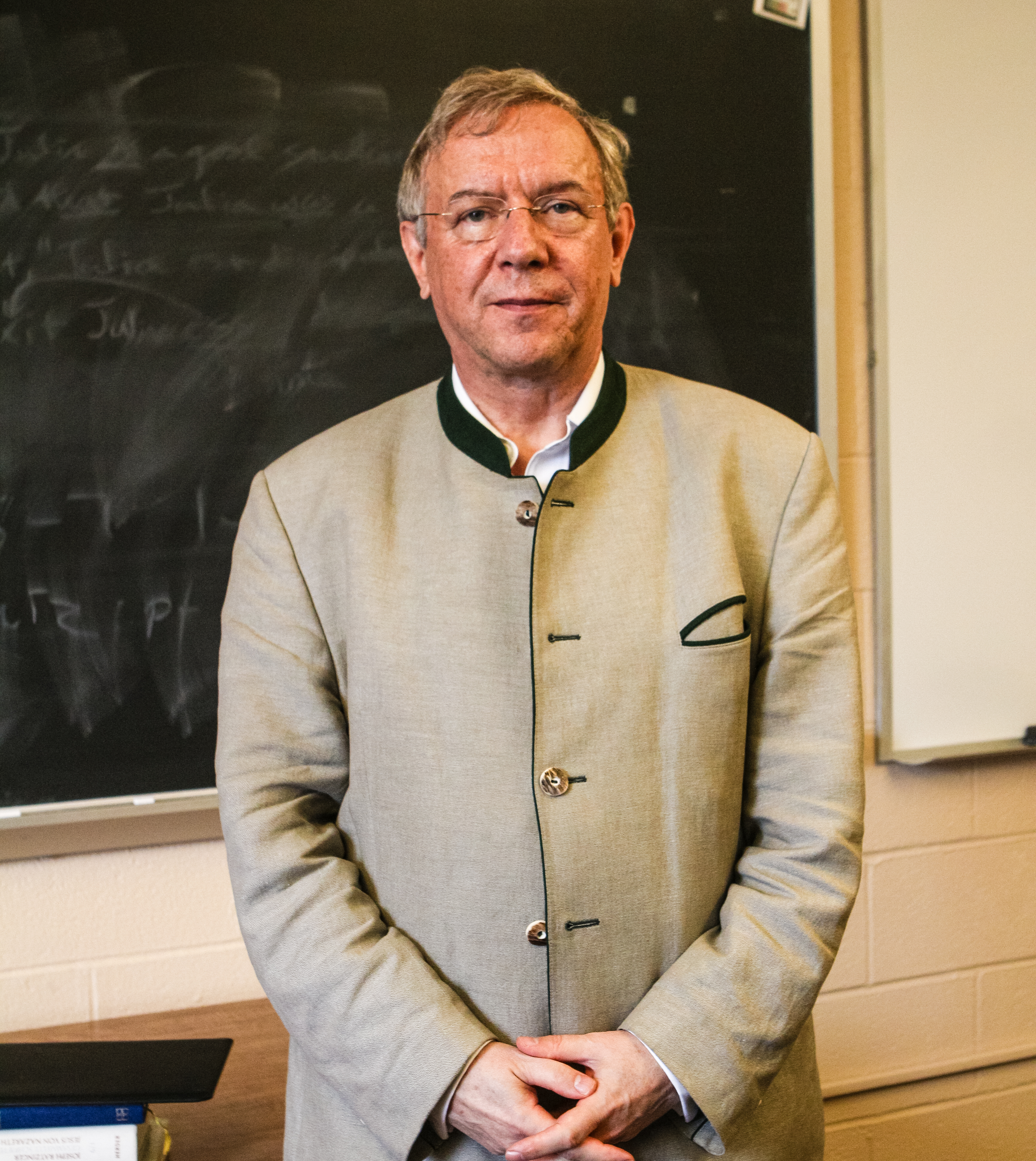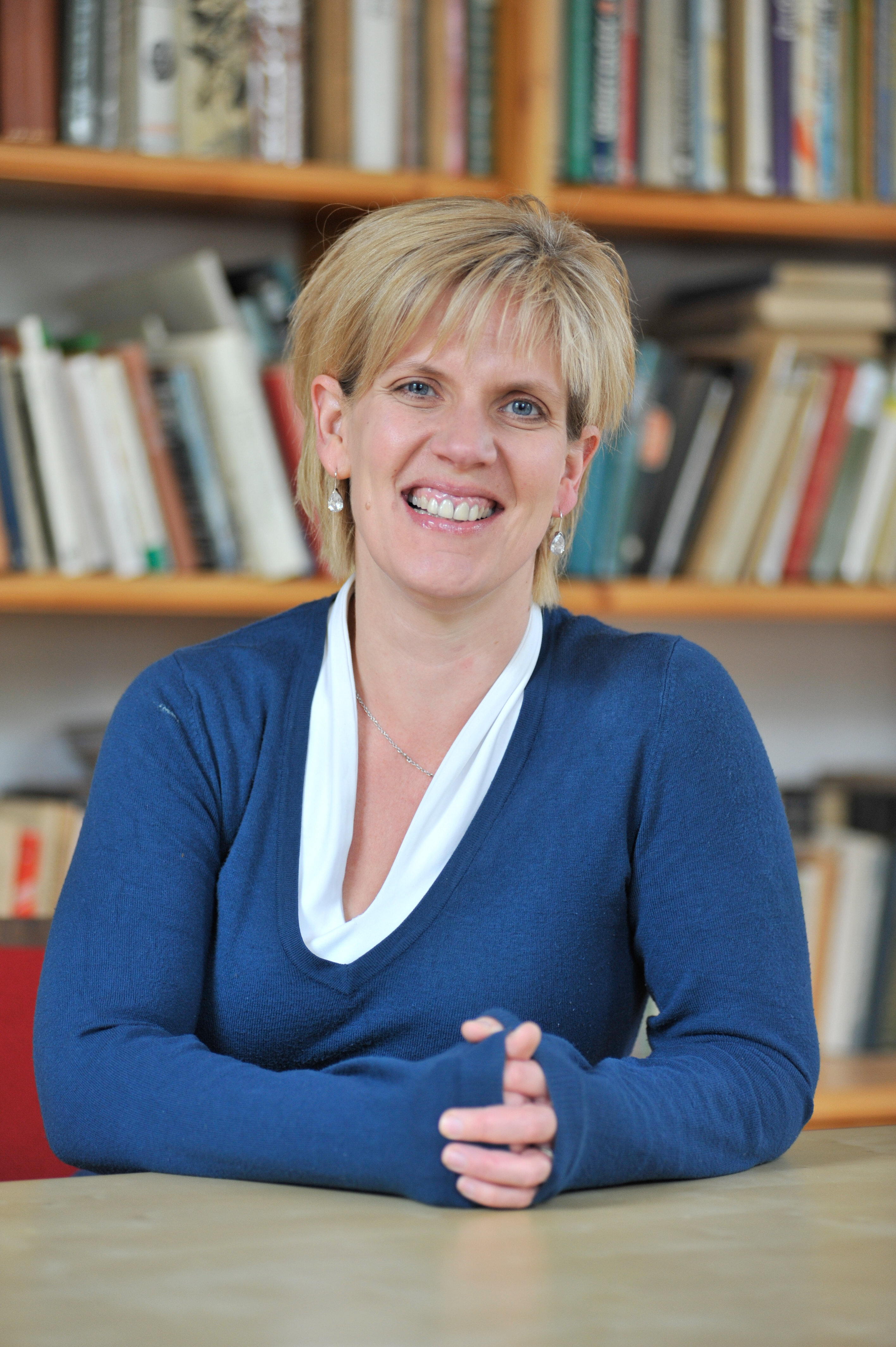Conference Speakers

Laetitia Calmeyn
Laetitia Calmeyn is an associate professor of moral theology at the Faculty of Notre Dame and the director of the Higher Institute of Religious Sciences of the Collège des Bernardins in Paris. After her studies at the Institute of Theological Studies in Brussels, she obtained a doctorate in moral theology from the Pontifical John Paul II Institute in Rome in 2009. In 2018, she was appointed consultant to the Congregation (now: Dicastery) for the Doctrine of the Faith. A nurse by training, she is a consecrated virgin in the archdiocese of Paris.
Laetitia Calmeyn ist außerordentliche Professorin für Moraltheologie an der Fakultät von Notre Dame und Leiterin der Abteilung für Religionswissenschaften am Collège des Bernardins in Paris. Nach ihrem Studium am Institut für Theologische Studien in Brüssel promovierte sie 2009 in Moraltheologie am Päpstlichen Institut Johannes Paul II. in Rom. Im Jahr 2018 wurde sie zur Beraterin der Kongregation (jetzt: Dikasterium) für die Glaubenslehre ernannt. Die gelernte Krankenschwester ist eine geweihte Jungfrau in der Erzdiözese von Paris.

Corbin Gams
Corbin Gams was born in Wäschenbeuren, Germany. He holds a canonical licentiate of theology from the Chur School of Theology in Switzerland. He is a lecturer in the Theology of the Body at the Benedict XVI School of Philosophy and Theology in Heiligenkreuz, Austria, where he also serves as director of studies and lecturer of a program on the Theology of the Body. He is a staff member of the “Initiative Christian Family” of the Austrian Bishops’ Conference and a frequently requested speaker on topics related to the family and the Theology of the Body in German-speaking countries.
Corbin Gams MTh wurde in Wäschenbeuren, Deutschland geboren. Er besitzt ein kanonisches Lizentiat der Theologie von der theologischen Hochschule Chur in der Schweiz. Er ist Dozent für die Theologie des Leibes an der Hochschule Benedikt XVI. in Heiligenkreuz, wo er auch als Studienleiter und Lehrbeauftragter des Studiengangs „Theologie des Leibes“ tätig ist. Er ist Mitarbeiter der „Initiative Christliche Familie“ bei der Österreichischen Bischofskonferenz und ein gefragter Referent für Themen rund um die Familie und die Theologie des Leibes in allen deutschsprachigen Ländern.

José Granados
José Granados holds a doctorate in theology and is professor of theology of marriage and family. He is the Superior General of the Disciples of the Hearts of Jesus and Mary, and he is the author of numerous books.
José Granados ist Doktor der Theologie und Professor für Theologie der Ehe und Familie. Er ist der Generalobere der Jünger der Herzen Jesu und Mariens. Er ist der Autor zahlreicher Bücher.

Stephan Kampowski
Stephan Kampowski is a professor of philosophical anthropology at the Pontifical John Paul II Theological Institute for Marriage and Family Sciences in Rome. Since 2012, he has been also an invited professor at the Faculty of Philosophy of the Pontifical University of Saint Thomas (Angelicum), Rome.
Stephan Kampowski ist Professor für philosophische Anthropologie am Päpstlichen Theologischen Institut Johannes Paul II. für Ehe- und Familienwissenschaften in Rom. Seit 2012 ist er auch Gastprofessor an der Philosophischen Fakultät der Päpstlichen Universität des hl. Thomas (Angelicum) in Rom.

Livio Melina
Livio Melina is a moral theologian. From 1996-2019, he was a professor of moral theology at the Pontifical John Paul II Institute for Studies on Marriage and Family in Rome, serving as the Institute’s president from 2006-2016. At the Institute, he founded and directed the International Research Area in Moral Theology. He is an ordinary member of the Pontifical Academy of Theology and has been the Scientific Director of the academic journal Anthropotes. He has been visiting professor in Washington DC and Melbourne and has given courses and lectures at various international universities.
Livio Melina ist Moraltheologe. Von 1996-2019 war er ordentlicher Professor für Moraltheologie am Päpstlichen Institut Johannes Paul II. für Studien über Ehe und Familie in Rom, dessen Präsident er von 2006-2016 war. Am Institut hat er den Internationalen Forschungsbereich für Moraltheologie gegründet und geleitet. Er ist ordentliches Mitglied der Päpstlichen Akademie für Theologie und war wissenschaftlicher Leiter der Fachzeitschrift Anthropotes. Er war Gastprofessor in Washington DC und in Melbourne und hat Kurse und Vorträge an verschiedenen internationalen Universitäten gehalten.

Bishop Stephan Oster
Bishop Stephan Oster was born in Amberg/Oberpfalz. After his Abitur, he completed formation to be a journalist for newspaper and radio and worked some years in this profession. He studied philosophy, history, and religion in Regensberg, at the University of Keele and at Oxford University and graduated from Oxford with a Master of Studies and from Regensburg with a Master of Arts. In 1995, he entered the novitiate of the Salesians of Don Bosco and professed solemn vows in 1999. From 1996 to 2000, he studied theology at the Philosophisch-Theologischen Hochschule Benediktbeuren and was ordained a priest in 2001. In 2003, he received a doctorate in philosophy from the Department of Theology at the University of Augsburg with a dissertation on Ferdinand Ulrich, for which he received in 2003 the Albertus-Magnus Prize of the Diocese of Augsburg and in 2004 the University prize of the Foundation of the Friends of the University of Augsburg. After his doctorate he taught as professor of philosophy, especially epistemology, metaphysics, philosophy of language, philosophy of dialogue, and philosophy of the person at the Philosophisch-Theologischen Hochschule Benediktbeuern. In 2009, he earned his Habilitation in Dogmatics with the Department of Theology at Trier University. The Habilitation dissertation was on the relation of the person and transubstantiation and was supervised by the then Professor of dogmatics in Trier, now Bishop of Regensburg, Dr. Rudolf Voderholzer. Afterwards he became the Professor of Dogmatics and the History of dogma at Philosophisch-Theologischen Hochschule Benediktbeuern. As a theologian in dogmatics, he devotes himself above all to personal-dialogical and theo-dramatic questions in systematic theology, especially in the fields of Christology, ecclesiology, and Mariology. On May 24th, 2014, he was ordained a bishop in the Cathedral of St. Stephen in Passau. He is vice-chairman of the Commission for Youth of the German Bishops’ Conference and is a member of the Commission on Marriage and Family.
Bischof Stephan Oster ist in Amberg/Oberpfalz geboren. Nach dem Abitur absolvierte er eine Ausbildung zum Zeitungs- und Hörfunkredakteur und arbeitete einige Jahre in diesem Beruf. Er studierte Philosophie, Geschichte und Religionswissenschaften in Regensburg, in Kiel, an der University of Keele (England) und an der University of Oxford und machte seinen Abschluss in Oxford mit dem Master of Studies und in Regensburg den Magister Artium. 1995 trat er in das Noviziat der Salesianer Don Boscos ein und legte 1999 die ewige Profess ab. Von 1996–2000 studierte er Theologie an der Philosophisch-Theologischen Hochschule Benediktbeuren und 2001 wurde er zum Priester geweiht. 2003 promovierte er in Philosophie an der Theologischen Fakultät der Universität Augsburg mit einer Arbeit über Ferdinand Ulrich, für die er 2003 den Albertus-Magnus-Preis der Diözese Augsburg und 2004 den Universitätspreis des Vereins der Freunde der Universität Augsburg erhielt. Nach seiner Promotion war er Dozent im Fach Philosophie, insbesondere zur Erkenntnistheorie, Metaphysik, Sprachphilosophie, Dialogphilosophie und Philosophie der Person an der Philosophisch-Theologischen Hochschule Benediktbeuern. 2009 habilitierte er sich im Fach Dogmatik an der Theologischen Fakultät der Universität Trier. Die Habilitationsschrift war zum Verhältnis von Person und Transsubstantiation und wurde vom damaligen Trierer Dogmatiker und heutigen Bischof von Regensburg Rudolf Voderholzer betreut. Es folgte die Ernennung zum ordentlichen Professor für Dogmatik und Dogmengeschichte an der PTH Benediktbeuern. Als Dogmatiker wandte sich Oster vor allem den personal-dialogischen und theodramatischen Fragen in der systematischen Theologie zu, insbesondere im Bereich der Christologie, Ekklesiologie und Mariologie. Am 24. Mai 2014 empfing er die Bischofsweihe im Dom St. Stephan in Passau. Er ist stellvertretender Vorsitzender der Jugendkommission der Deutschen Bischofskonferenz und Mitglied der Kommission für Ehe und Familie.

Helmut Prader
Helmut Prader has been a priest of the Diocese of St. Pölten/Austria since 2000. He received his doctorate from the John Paul II Institute for Studies on Marriage and Family at the Lateran University in Rome. He is a professor of moral theology and bioethics at the Hochschule Benedict XVI in Heiligenkreuz, Austria. In addition, he is the diocesan family chaplain and diocesan judge. He is a speaker and member of the board of directors of the “Institut für Natürliche Empfängnisregelung Dr. med. Josef Rötzer e.V.”
Helmut Prader ist seit 2000 Priester der Diözese St. Pölten/Österreich. Er hat am Institut Johannes Paul II. zu Studien über Ehe und Familie an der Lateranuniversität in Rom promoviert. Er ist Professor für Moraltheologie und Bioethik an der Hochschule Benedikt XVI. Heiligenkreuz, Österreich. Zudem ist er Diözesanfamilienseelsorger und Diözesanrichter. Er ist Referent und Direktoriumsmitglied des „Instituts für Natürliche Empfängnisregelung Dr. med. Josef Rötzer e.V.“

Michael Maria Waldstein
Michael Maria Waldstein is a professor of New Testament at Franciscan University of Steubenville. Until December 2017, he was the Max Seckler professor of Theology at Ave Maria University in Florida. He began his service as scholar and teacher in 1988 at the University of Notre Dame, where he earned tenure in 1996. From 1996 to 2006 he served as the founding president of the International Theological Institute in Gaming, Austria, and as the St. Francis of Assisi Professor of New Testament (2006-2008). He was a member of the Pontifical Council for the Family (2003-2009), the Board of Trustees of the University of Eichstaett, Germany (2007-2011). He is an Ordinary Academician of the Pontifical Academy of St. Thomas Aquinas, Rome (2011-). He holds a B.A. from Thomas Aquinas College, a Ph.D. in Philosophy from the University of Dallas, an S.S.L. (summa cum laude) from the Pontifical Biblical Institute in Rome, and a Th.D. from Harvard University in New Testament and Christian Origins. His published works include a critical edition of the four Coptic manuscripts of Secret John, and a new translation of John Paul II’s Theology of the Body (the Introduction appeared as a separate book in Polish), as well as numerous articles on the Gospel of John, Gnosticism, St. Thomas Aquinas, John Paul II and Hans Urs von Balthasar in journals such as Journal of Early Christian Studies, Nova et Vetera, Modern Theology, Communio, Anthropotes, Forum Teologiczne, and Lateranum.
Michael Maria Waldstein ist Universitätsprofessor für Neues Testament an der Franciscan University of Steubenville. Bis Dezember 2017 war er Max Seckler Professor für Theologie an der Ave Maria University in Florida. Er begann seinen Dienst als Wissenschaftler und Dozent im Jahr 1988 an der University of Notre Dame, wo er 1996 die Lehrbefugnis erhielt. Von 1996 bis 2006 war er Gründungspräsident des Internationalen Theologischen Instituts in Gaming, Österreich, und St. Franz von Assisi Professor für Neues Testament (2006-2008). Er war Mitglied des Päpstlichen Rates für die Familie (2003-2009) und des Kuratoriums der Universität Eichstätt, Deutschland (2007-2011). Er ist Ordentliches Mitglied der Päpstlichen Akademie St. Thomas von Aquin in Rom (seit 2011). Er hat einen B.A. vom Thomas Aquinas College, einen Doktortitel in Philosophie von der University of Dallas, ein Lizentiat in Biblischer Theologie (summa cum laude) vom Päpstlichen Bibelinstitut in Rom und einen Doktortitel der Harvard University in Neuem Testament und Christlichen Quellen. Zu seinen veröffentlichten Werken gehören eine kritische Ausgabe der vier koptischen Handschriften des Apokryphons des Johannes und eine neue Übersetzung der Theologie des Leibes von Johannes Paul II. (die Einleitung erschien als separates Buch auf Polnisch) sowie zahlreiche Artikel über das Johannesevangelium, den Gnostizismus, den Heiligen Thomas von Aquin, Johannes Paul II. und Hans Urs von Balthasar in Zeitschriften wie Journal of Early Christian Studies, Nova et Vetera, Modern Theology, Communio, Anthropotes, Forum Teologiczne und Lateranum.

Katharina Westerhorstmann
Katharina Westerhorstmann is a Professor of Theology and Medical Ethics at Franciscan University of Steubenville in Gaming (Austria). After studying philosophy and theology at the School of Theology in Paderborn, Germany, she held a teaching position beginning in 2003 and earned a doctorate in Catholic Social Teaching in 2004. From 2008-2010 she was Academic Director of the Interdisciplinary Ethics Center at the University of Freiburg. After a research fellowship at the Hebrew University of Jerusalem and further teaching positions at the Universities of Paderborn, Freiburg, Cologne and Bonn, she was habilitated in moral theology at the University of Bonn in 2014, where she was the (Substitute) Chair of Moral Theology 2014-2015. From 2016-2018, she served as the Substitute Chair of Moral Theology at the Catholic University of Eichstätt-Ingolstadt. After teaching at the Newmaninstutite in Uppsala, Sweden, for one semester in 2018, she joined the University of Notre Dame (USA) as a visiting professor with a research project on addressing the sexual abuses in the Catholic Church for two semesters in 2019.
Since 2020, she has been a professor at Franciscan University of Steubenville, in the Austrian Program, in Gaming.
Her publications include a monograph on Edith Stein’s work in the light of the debate on gender theories, and a book on the love commandment in Jewish-Christian dialogue. She co-edited a book on human dignity and spirituality at the end of life and co-authored a book of the German Bishops conference on Palliative and Pastoral Care for the Dying. She has published more than forty articles on moral theology and medical ethics in academic journals and as book chapters. Since 2021 she has been a consultant on the Doctrinal Commission of the German Bishops` conference.
Katharina Westerhorstmann ist ordentliche Universitätsprofessorin für Theologie und Medizinische Ethik an der Franciscan University of Steubenville in Gaming (Österreich). Nach dem Studium der Philosophie und Theologie an der Theologischen Fakultät Paderborn (Deutschland) hatte sie ab 2003 einen Lehrauftrag und erwarb 2004 einen Doktortitel in Katholischer Soziallehre. Von 2008-2010 war sie Akademische Geschäftsführerin des Interdisziplinären Ethikzentrums der Universität Freiburg. Nach einem Forschungsaufenthalt an der Hebräischen Universität von Jerusalem und weiteren Lehraufträgen an den Universitäten in Paderborn, Freiburg, Köln und Bonn wurden sie 2014 an der Universität Bonn in Moraltheologie habilitiert. Von 2016-2018 war sie Lehrstuhlvertreterin für Moraltheologie an der Katholischen Universität Eichstätt-Ingolstadt. Nachdem sie 2018 ein Semester lang am Newmaninstutite in Uppsala, Schweden, gelehrt hatte, kam sie 2019 als Gastprofessorin mit einem Forschungsprojekt zur Aufarbeitung des sexuellen Missbrauchs in der Katholischen Kirche für zwei Semester an die University of Notre Dame (USA).
Seit 2020 ist sie Professorin an der Franciscan University of Steubenville, im Austrian Program, in Gaming.
Ihre Veröffentlichung umfassen je eine Monographie zum Werk Edith Steins im Licht der Genderdiskussionen und ein Buch zum Liebesgebot im Jüdisch-Christlichen Dialog. Sie hat ein Buch zur Menschlichen Würde und Spiritualität am Lebensende mit herausgegeben und war Mitautorin einer Handreichung der Deutschen Bischöfe zur palliativen und seelsorglichen Begleitung von Sterbenden. Sie hat mehr als vierzig Artikel zu moraltheologischen und medizinethischen Fragestellungen sowie zur Aufarbeitung des sexuellen Missbrauchs in der Kirche in akademischen Zeitschriften und als Buchkapitel veröffentlicht.
Seit 2021 ist Katharina Westerhorstmann außerdem Beraterin der Glaubenskommission der Deutschen Bischofskonferenz.

Maria Wolter
Maria Wolter graduated with a B.A. in Philosophy, Theology, and History from Franciscan University of Steubenville. She pursued her M.A. in Philosophy, as well as her STB, M.A., and STL in Theology at the Katholieke Universiteit in Leuven (KUL), Belgium, where she also received her Ph.D. in Philosophy. An Austrian-American national, she works as an Associate Professor of Philosophy for Franciscan University of Steubenville at its Study Abroad Program in Gaming, Austria. Dr. Wolter works in the areas of phenomenology, axiology, personalist philosophy, and ethics. Her research has also focused on the philosophy of Dietrich von Hildebrand, Karol Wojtyla, and John Henry Newman.
Maria Wolter schloss ihr Studium mit einem B.A. in Philosophie, Theologie und Geschichte an der Franciscan University of Steubenville ab. Sie absolvierte ihren M.A. in Philosophie sowie ihren STB, M.A. und STL in Theologie an der Katholieke Universiteit in Leuven (KUL), Belgien, wo sie auch ihren Ph.D. in Philosophie erhielt. Als österreichisch-amerikanische Staatsbürgerin arbeitet sie als Assistenzprofessorin für Philosophie an der Franciscan University of Steubenville im Rahmen des Study Abroad Program in Gaming, Österreich. Dr. Wolter arbeitet in den Bereichen Phänomenologie, Axiologie, personalistische Philosophie und Ethik. Ihre Forschung konzentrierte sich auf die Philosophie von Dietrich von Hildebrand, Karol Wojtyla und John Henry Newman.

